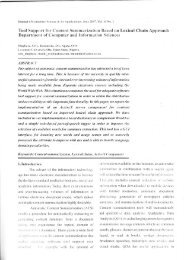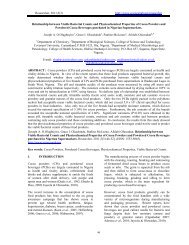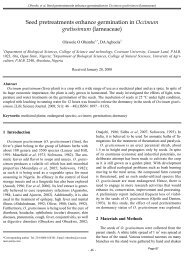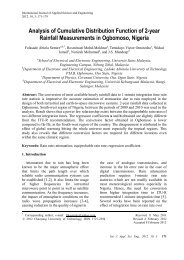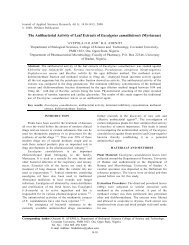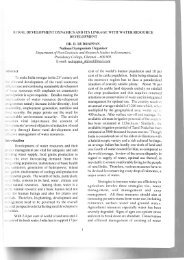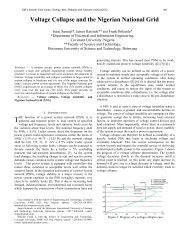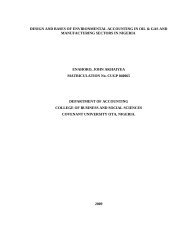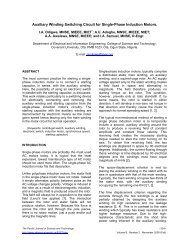Download (8Mb) - Covenant University Repository
Download (8Mb) - Covenant University Repository
Download (8Mb) - Covenant University Repository
Create successful ePaper yourself
Turn your PDF publications into a flip-book with our unique Google optimized e-Paper software.
three types: Old women, young women without children, or only with daughters and<br />
young widows with sons. An old woman remains with her sons. The younger woman<br />
without children will be evicted. The woman with young sons will remain with her<br />
husband's kin-tenuously surviving and protecting the interests ofher sons (which may<br />
be her own interest) against in-laws who would rather exercise closer control over her<br />
deceased husb::nd's farms.<br />
Guyer (1986) further stated that it is more common to find systems where<br />
women have only limited rights. In Sudan-Sahelian West Africa, women usually have<br />
very limited rights to cultivate on their own-account; growing land scarcity and<br />
concentration are shrinking their allotments. In East Africa, where the house-property<br />
complex gave women certain kinds of well defined rights, in terms of their role in<br />
transmitting property from fathers to sons, land registration and titling have gone<br />
exclusively to men. In SouthernAfrica, by contrast, the presence ofvery large numbers<br />
offemale-headed households has put pressures on government to protect the rights of<br />
women. These 'systems' are by no means hard and fast, and a lot ofsocial groups in the<br />
geographic and cultural areas identified have quite different patterns of rights of<br />
women.<br />
According to Bohannan and Bohannan (1968), women's land rights among<br />
the Tiv ofNigeria depend on either residence ormarriage. A wife or widow has the right<br />
to a plot of land large enough to support herselfand her dependants. A wife who does<br />
not gain a plot of land after marriage has the right to leave and re-demand her bride<br />
wealth.Invariably th(j.fefore, despite variations in customary law across regions and<br />
nations, there are wme commonalities. Most customary law is not codified but<br />
emerges from unwritten social rules that ostensibly are derived from shared<br />
community values and traditions but which often reflect patriarchal relations between<br />
women and men. Under most systems of customary law, women regardless of their<br />
marital status cannot own or inherit land, property, or housing in their own names, and<br />
whatever property rights they may enjoy are dependent upon their male relatives<br />
(COHRE,2003).<br />
Many developing countries have, in the past several decades, adopted<br />
legislations that give women some rights to land and to elevate women's status within<br />
the household. Often, however, this legislation has not been successful in achieving its<br />
stated goals. RDI's research on these issues have shown that written laws have had<br />
limited effect on women's rights and access to land due to the continued prevalence of<br />
customary laws in governing gender-related cultural norms and intra-household<br />
atTairs. In some cases, especially in matrilineal societies, customary law may offer<br />
greater protection of women's rights and access to land than new legal systems that<br />
formalize land rights, even when these systems attempt to reflect women's rights and<br />
needs (RDI, 2007).<br />
Indeed, understanding the effects of laws - both written and customary <br />
regarding land tenure and intra-household division of rights and responsibilities for<br />
women is critical in fonnulating effective policy measures to address women's secure<br />
access to land. There are clear distinctions among Nigerian societies as to the<br />
customary treatment of men and women. Ogunleye (1993) frames women's<br />
entitlements and rights in terms ofrestoring equitable access to resources. The inability<br />
ofwomen to exercise independent control over their life relates to the role ofculture in<br />
the exercise ofsocial control over individuals. Women are in a subordinate position to






